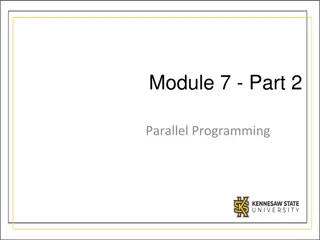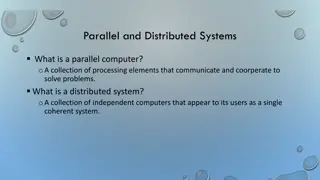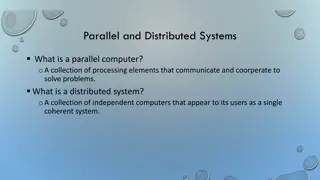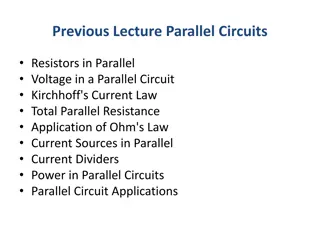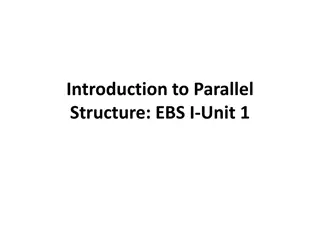Efficient Techniques for Writing Parallel Programs
Learn about writing parallel programs, thread processes, private and shared variables, rules for specifying variables, and static scheduling for optimized performance. Understand the concepts through code examples and best practices in parallel programming.
Download Presentation

Please find below an Image/Link to download the presentation.
The content on the website is provided AS IS for your information and personal use only. It may not be sold, licensed, or shared on other websites without obtaining consent from the author. Download presentation by click this link. If you encounter any issues during the download, it is possible that the publisher has removed the file from their server.
E N D
Presentation Transcript
Writing Parallel Program Writing Parallel Program- -2 2
Recap Recap Process Thread Parallel program
Writing a Parallel Program Writing a Parallel Program Sequential Program int t=0; for(i=0;i<N;i++) { t= a[i] + b[i]; c[i] = t; } Parallel program #pragma omp parallel for for(i=0;i<N;i++) { t= a[i] + b[i]; c[i] = t; }
Private and Shared Private and Shared Shared variable: single instance is shared among all threads Private variable: each thread has its own local copy Example int x = 5; #pragma omp parallel { int a = x+1; }
Private and Shared Private and Shared Shared variable: single instance is shared among all threads Private variable: each thread has its own local copy Example Example int x = 5; int x = 5; #pragma omp parallel private(x){ int x = x+1; // bad programming } #pragma omp parallel { int a = x+1; }
Rules to Specify Private and Shared Variables Rules to Specify Private and Shared Variables Loop iteration variable is private int a[N]; int i=0; : #pragma omp parallel for for(i=0;i<N;i++) a[i] = i; int a[N]; : #pragma omp parallel for for(int i=0;i<N;i++) a[i] = i; Better programming practice
Rules to Specify Private and Shared Variables Rules to Specify Private and Shared Variables Explicit specification of shared and private variables int n; int a; int b; : #pragma omp parallel for shared(n, a) private(b) for (int i = 0; i < n; i++) { int t = b; // b = a + i; } Values of a private variable is undefined at the entry and exit of a parallel region.
Static Schedule Static Schedule int nthreads=10 #pragma omp parallel for shared(a,b,c) private(i) schedule(static) parallel for(i=0;i<N;i++) c[i] = a[i] + b[i]; Distribute the chunk of iterations to threads thread 1 : iteration 0 (N/10)-1 thread 2: iteration (N/10) 2*(N/10)-1 : thread 10: iteration 9*(N/10) N-1
Another Static Schedule Another Static Schedule #pragma omp parallel for shared(a,b,c) private(i) schedule(static,size of the chunk=4) parallel for(i=0;i<64;i++) c[i] = a[i] + b[i]; Distribute the chunk of iterations to threads thread 1 : iteration {0,1,2,3}, {16,17,18,19}, thread 2: iteration {4,5,6,7}, {20,21,22,23}, thread 3 : iteration {8,9,10,11}, {24,25,26,27}, thread 4: iteration {12,13,14,15}, {28,29,30,31},
Dynamic Schedule Dynamic Schedule schedule(dynamic, n): Default value of n=1 Each thread 1. executes a chunk of n iterations 2. requests another chunk No particular order of chunk assignments to threads
Static vs Dynamic Schedule Static vs Dynamic Schedule 1. Dynamic scheduling is preferred when the iterations are of different computational size 2. Dynamic scheduling incurs runtime overhead unlike static scheduling as distribution is performed during execution
Waiting in `parallel for Waiting in `parallel for No synchronization at the beginning of a parallel for loop. Threads synchronize at the end of a parallel for loop. Ref: https://ppc.cs.aalto.fi/ch3/nowait/
Waiting in `parallel for Waiting in `parallel for `nowait removes the synchronization Ref: https://ppc.cs.aalto.fi/ch3/nowait/



